2017-2018五年级英语上册总复习资料(全册)
- 格式:doc
- 大小:80.04 KB
- 文档页数:6
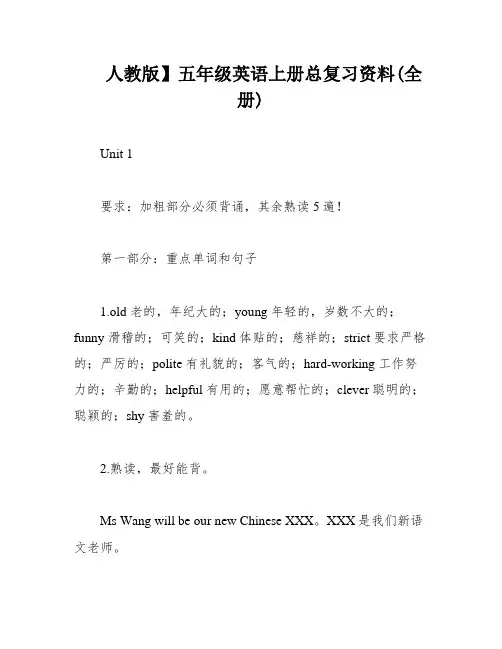
人教版】五年级英语上册总复习资料(全册)Unit 1要求:加粗部分必须背诵,其余熟读5遍!第一部分:重点单词和句子1.old 老的,年纪大的;young 年轻的,岁数不大的;funny 滑稽的;可笑的;kind 体贴的;慈祥的;strict 要求严格的;严厉的;polite 有礼貌的;客气的;hard-working 工作努力的;辛勤的;helpful 有用的;愿意帮忙的;clever 聪明的;聪颖的;shy 害羞的。
2.熟读,最好能背。
Ms Wang will be our new Chinese XXX。
XXX是我们新语文老师。
What’s she like。
她怎么样?She’s very kind。
她很和蔼。
Is she strict。
她严格吗?Yes。
sometimes。
是的,有时候。
Do you know Mr Young。
你认识XXX吗?No。
I don’t。
不,不认识。
Yes。
I do。
是的,我认识。
Who is your maths XXX。
谁是你的数学老师?Mr Li。
XXX。
XXX XXX。
他搞笑吗?Yes。
he is。
是的,他搞笑。
No。
he isn’t。
不,不搞笑。
第二部分:知识点1.Be (is。
am。
are) 的用法口诀:Be 动词 am is are;我 (I) 用 am,你 (you) 用 are;is 连着他、她、它 (he。
she。
it);我们、你们和他们 (we。
you。
they),全部都用 are。
单数 is;复数 are;he is 他是;she is 她是;it is 它是;you are 你(们)是;we are 我们是;they are 它们是;I am 我是)。
What does。
like。
是问某人或某物喜欢什么的意思。
例如:XXX。
你的父亲喜欢什么?答案可以是:XXX。
(接着喜欢的东西)。
要注意,这里的like是动词,表示喜欢。
在发音方面,我们需要注意-y[i]和-y[ai]的读音。
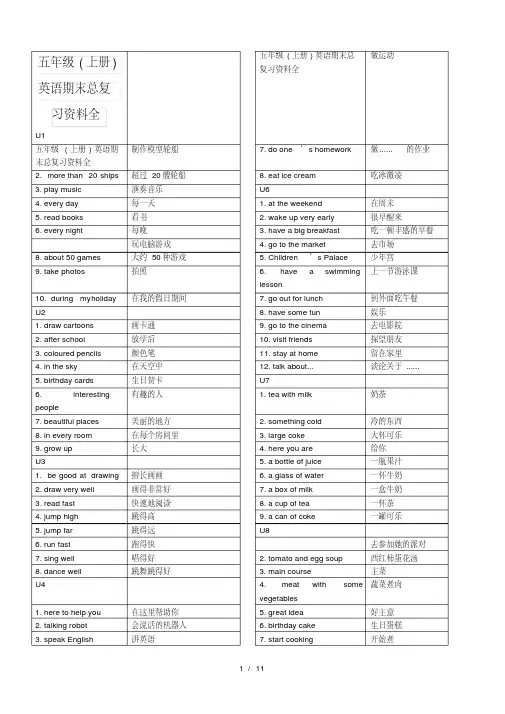
五年级(上册)英语期末总复习资料全U1 五年级(上册)英语期末总复习资料全做运动五年级(上册)英语期末总复习资料全制作模型轮船7. do one’s homework 做......的作业2. more than 20 ships 超过20艘轮船8. eat ice cream 吃冰激凌3. play music 演奏音乐U64. every day 每一天 1. at the weekend 在周末5. read books 看书 2. wake up very early 很早醒来6. every night 每晚 3. have a big breakfast 吃一顿丰盛的早餐玩电脑游戏 4. go to the market 去市场8. about 50 games 大约50种游戏 5. Children’s Palace 少年宫9. take photos 拍照 6. have a swimminglesson上一节游泳课10. during my h oliday 在我的假日期间7. go out for lunch 到外面吃午餐U28. have some fun 娱乐1. draw cartoons 画卡通9. go to the cinema 去电影院2. after school 放学后10. visit friends 探望朋友3. coloured pencils 颜色笔11. stay at home 留在家里4. in the sky 在天空中12. talk about... 谈论关于......5. birthday cards 生日贺卡U76. interestingpeople有趣的人 1. tea with milk 奶茶7. beautiful places 美丽的地方 2. something cold 冷的东西8. in every room 在每个房间里 3. large coke 大杯可乐9. grow up 长大 4. here you are 给你U3 5. a bottle of juice 一瓶果汁1. be good at drawing 擅长画画 6. a glass of water 一杯牛奶2. draw very well 画得非常好7. a box of milk 一盒牛奶3. read fast 快速地阅读8. a cup of tea 一杯茶4. jump high 跳得高9. a can of coke 一罐可乐5. jump far 跳得远U86. run fast 跑得快去参加她的派对7. sing well 唱得好 2. tomato and egg soup 西红柿蛋花汤8. dance well 跳舞跳得好 3. main course 主菜U4 4. meat with somevegetables蔬菜煮肉1. here to help you 在这里帮助你 5. great idea 好主意2. talking robot 会说话的机器人 6. birthday cake 生日蛋糕3. speak English 讲英语7. start cooking 开始煮4. good at many擅长很多事情U9things5. clean very well 清洁得很好来吧6. write very fast 写得很快 2. time for lunch 到午餐时间7. do everything 做所有事情 3. look great 看起来不错U5 4. try the chicken first 先吃鸡肉1. daily life 日常生活 5. smell delicious 闻起来美味2. talk with... 与......谈话 6. hot food 辣的食物3. on weekdays 在工作日;在平日(放结尾)7. quite sweet 很甜4. find him there 在那里找到他8. look fresh 看起来新鲜5. look for... 寻找...... 9. is very sweet 是很甜的10. are salty 是咸的11. look quite good 看起来很好12. taste good 好吃U101. different tastes 不同的口味2. we all know 我们都知道3. Western people 西方人4. chopsticks and碗筷bowls5. in the West 在西方6. knife and fork 刀叉7. for example 例如8. sweet and sour food 酸甜的食物9. plenty of 大量10. salty food 咸的食物来自四川的人11. people fromSichuan12. too hot 太辣13. taste terrible 难吃U111. the weather here 这里的天气2. play outdoors 在户外玩耍3. wear hats and coats 戴帽子穿大衣4. I hope I can 我希望我能5. visit England 参观英格兰6. some day 某一天7. wear T-shirts 穿体恤8. hot and dry 又热又干燥9. eat lots of fruit 吃很多水果10. fly kites 放风筝11. make a snowman 堆雪人U121. in one day 在一天里2. something有趣的东西interesting3. weather report 天气预报4. put on 穿上5. go away 走开6. turn blue 变成蓝色7. start to shine 开始闪耀8. at lunchtime 在午饭时间9. rain hard 雨下得很大10. go home 回家11. windy and cool 风大凉爽12. walk home 走路回家五年级(上册)英语期末总复习资料全1.What is your hobby? (问爱好)你的爱好是什么?My hobby is making model planes. 我的爱好是做模型飞机。
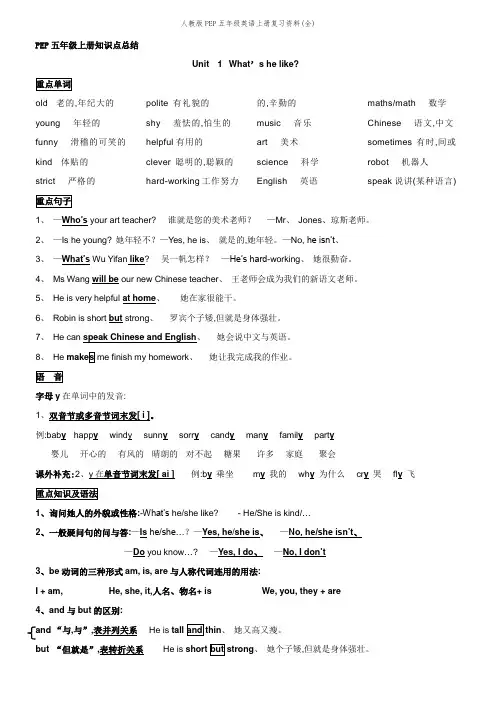
PEP 五年级上册知识点总结Unit 1 What ’s he like?old 老的,年纪大的young 年轻的funny 滑稽的可笑的kind 体贴的strict 严格的polite 有礼貌的 shy 羞怯的,怕生的 helpful 有用的 clever 聪明的,聪颖的 hard-working 工作努力的,辛勤的 music 音乐 art 美术 science 科学 English 英语 maths/math 数学 Chinese 语文,中文 sometimes 有时,间或 robot 机器人 speak 说讲(某种语言)1、 —Who’s your art teacher? 谁就是您的美术老师? —Mr 、 Jones 、琼斯老师。
2、 —Is he young? 她年轻不?—Yes, he is 、 就是的,她年轻。
—No, he isn’t 、3、 —What’s Wu Yifan like ? 吴一帆怎样? —He’s hard -working 、 她很勤奋。
4、 Ms Wang will be our new Chinese teacher 、 王老师会成为我们的新语文老师。
5、 He is very helpful at home 、 她在家很能干。
6、 Robin is short but strong 、 罗宾个子矮,但就是身体强壮。
7、 He can speak Chinese and English 、 她会说中文与英语。
8、 He、 她让我完成我的作业。
字母y 在单词中的发音:1、双音节或多音节词末发[ i ]。
例:bab y happ y windy sunn y sorr y cand y man y famil y part y婴儿 开心的 有风的 晴朗的 对不起 糖果 许多 家庭 聚会课外补充:2、y 在单音节词末发[ ai ] 例:b y 乘坐 m y 我的 wh y 为什么 cr y 哭 fl y 飞1、询问她人的外貌或性格:-What’s he/she like? - He/She is kind/…2、一般疑问句的问与答:—Is he/she…?—Yes, he/she is 、 —No, he/she isn’t 、—Do you know …? —Yes, I do 、 —No, I don ’t3、be 动词的三种形式am, is, are 与人称代词连用的用法:I + am, He, she, it,人名、物名+ is We, you, they + are4、and 与but 的区别:and “与,与”,表并列关系 He is 、 她又高又瘦。
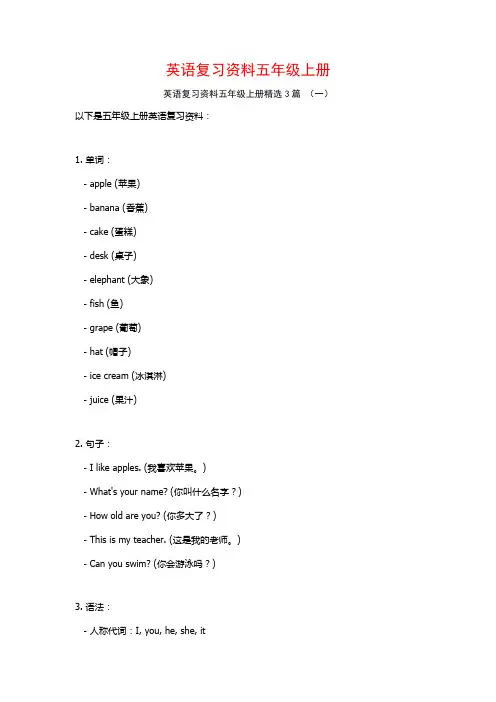
英语复习资料五年级上册英语复习资料五年级上册精选3篇(一)以下是五年级上册英语复习资料:1. 单词:- apple (苹果)- banana (香蕉)- cake (蛋糕)- desk (桌子)- elephant (大象)- fish (鱼)- grape (葡萄)- hat (帽子)- ice cream (冰淇淋)- juice (果汁)2. 句子:- I like apples. (我喜欢苹果。
)- What's your name? (你叫什么名字?)- How old are you? (你多大了?)- This is my teacher. (这是我的老师。
)- Can you swim? (你会游泳吗?)3. 语法:- 人称代词:I, you, he, she, it- 时态:一般现在时,一般过去时- 动词的变化规则:一般情况下,动词的变化规则是在动词原形后面加-s,表示第三人称单数。
4. 课文内容:- My School (我的学校)- My Class (我的班级)- My Friends (我的朋友们)- I Like... (我喜欢...)- Can You Swim? (你会游泳吗?)以上是五年级上册英语的复习资料,希望对你有帮助!英语复习资料五年级上册精选3篇(二)以下是五年级下册英语复习资料的建议:词汇复习:- 复习并记忆本学期学过的词汇,包括形容词、动词、副词等等。
- 组织词汇游戏,如卡片配对、写下近义词和反义词等,以帮助记忆。
语法复习:- 复习多种时态的用法,如一般现在时、一般过去时和将来时。
- 复习句子结构,如肯定句、否定句和疑问句以及相关的语序。
- 复习形容词和副词的比较级和最高级的用法。
阅读理解和写作:- 阅读有关五年级学科的英语文章,包括科学、历史和地理等等。
- 练习回答问题,根据文章内容进行思考和回答问题。
- 练习写作,写一篇关于自己周末活动的小短文。
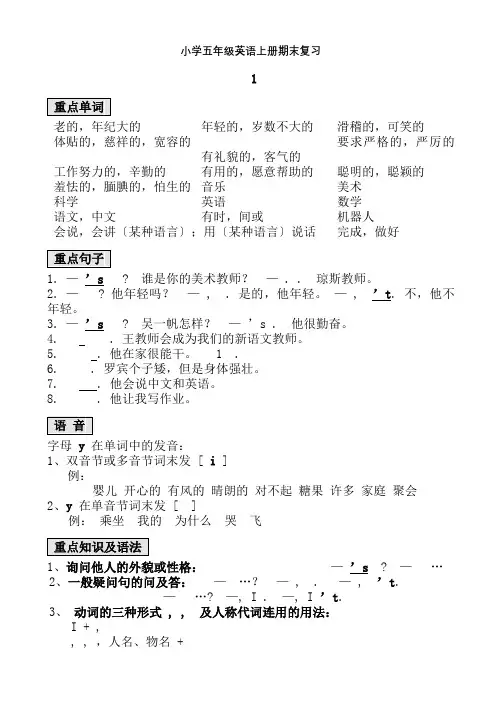
小学五年级英语上册期末复习1老的,年纪大的年轻的,岁数不大的滑稽的,可笑的体贴的,慈祥的,宽容的要求严格的,严厉的有礼貌的,客气的工作努力的,辛勤的有用的,愿意帮助的聪明的,聪颖的羞怯的,腼腆的,怕生的音乐美术科学英语数学语文,中文有时,间或机器人会说,会讲〔某种语言〕;用〔某种语言〕说话完成,做好1. —’s ? 谁是你的美术教师?— . . 琼斯教师。
2. — ? 他年轻吗?— , . 是的,他年轻。
— , ’t. 不,他不年轻。
3. —’s ? 吴一帆怎样?—’s .他很勤奋。
4. . 王教师会成为我们的新语文教师。
5. . 他在家很能干。
1 .6. . 罗宾个子矮,但是身体强壮。
7. . 他会说中文和英语。
8. . 他让我写作业。
字母y在单词中的发音:1、双音节或多音节词末发 [ i ]例:婴儿开心的有风的晴朗的对不起糖果许多家庭聚会2、y在单音节词末发 [ ]例:乘坐我的为什么哭飞1、询问他人的外貌或性格:—’s ? —…2、一般疑问句的问及答:—…?— , . — , ’t.—…? —, I . —, I ’t.3、动词的三种形式 , , 及人称代词连用的用法:I + ,, , ,人名、物名 +, , +4、., , ., . 的区别:. []〔缩略词〕〔用于女子的姓氏或姓名前,不指明婚否〕女士;[mɪs]〔用于未婚女子的姓氏或姓名前,以示礼貌〕小姐,女士;. [ˈmɪə]〔的缩略词〕〔用于男子的姓氏或姓名前〕先生;. []〔用于已婚女子的姓氏或姓名前〕太太;夫人。
X k B 1 . c o m5、和的区别:“和,及〞,表并列关系. 他又高又瘦。
“但是〞,表转折关系. 他个子矮,但是身体强壮。
课本 P9介绍自己、朋友或教师等熟悉的人物。
如:…… / …..1. 开头:交代人物的身份I … …2. 中间:体貌… …… ;性格…;爱好… 或… .3. 结尾:评价人物或抒发对人物的情感 I .样例:I a . . . . . . , . . . . .2(.) 周日 (.) 周一 (.) 周二(.) 周三 (.) 周四 (.) 周五(.) 周六周末〔周六、日〕洗衣服看电视做作业看书踢足球在周末做体育运动听音乐打乒乓球1. — ? 星期四你们上什么课?— I , . 我们上数学、英语和音乐课。
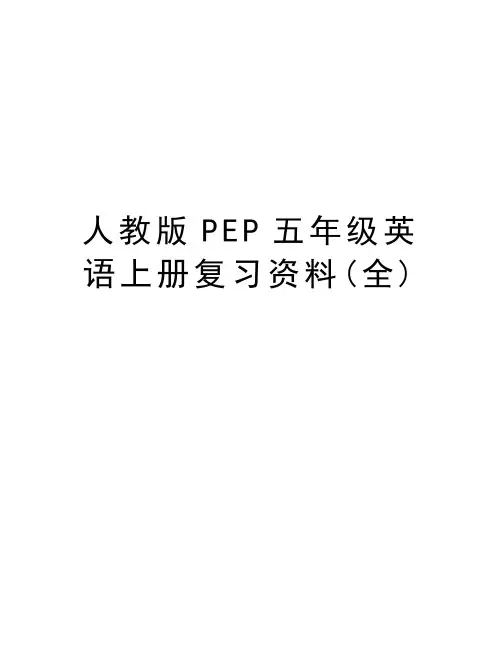
人教版P E P五年级英语上册复习资料(全)PEP五年级上册知识点总结Unit 1 What’s he like?old 老的,年纪大的young 年轻的funny 滑稽的可笑的kind 体贴的strict 严格的polite 有礼貌的shy 羞怯的,怕生的helpful有用的clever 聪明的,聪颖的hard-working工作努力的,辛勤的music 音乐art 美术science 科学English 英语maths/math 数学Chinese 语文,中文sometimes 有时,间或robot 机器人speak说讲(某种语言)1. —Who’s your art teacher? 谁是你的美术老师?—Mr. Jones.琼斯老师。
2. —Is he young? 他年轻吗?—Yes, he is. 是的,他年轻。
—No, he isn’t.3. —What’s Wu Yifan like? 吴一帆怎样?—He’s hard-working. 他很勤奋。
4. Ms Wang will be our new Chinese teacher. 王老师会成为我们的新语文老师。
5. He is very helpful at home. 他在家很能干。
6. Robin is short but strong. 罗宾个子矮,但是身体强壮。
7. He can speak Chinese and English. 他会说中文和英语。
8. He他让我完成我的作业。
字母y在单词中的发音:1、双音节或多音节词末发[ i ]。
例:bab y happ y windy sunn y sorr y cand y man y famil y part y婴儿 开心的 有风的 晴朗的 对不起 糖果 许多 家庭 聚会课外补充:2、y 在单音节词末发[ ai ] 例:b y 乘坐 m y 我的 wh y 为什么 cr y 哭 fl y 飞1、询问他人的外貌或性格:-What’s he/she like? - He/She is kind/…2、一般疑问句的问与答:—Is he/she…?—Yes, he/she is. —No, he/she isn’t. —Do you know …? —Yes, I do. —No, I don ’t3、be 动词的三种形式am, is, are 与人称代词连用的用法:I + am, He, she, it ,人名、物名+ is We, you, they + are 4、and 和but 的区别:and “和,与”,表并列关系 He is . 他又高又瘦。
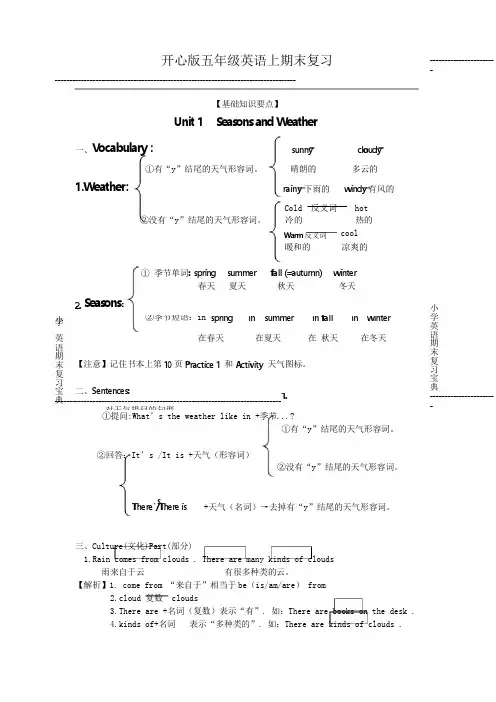
学②季节短语:in springin summer in fallin winter------------------------------------------------------------------------------1.对天气提问的句型:s开心版五年级英语上期末复习----------------------------------------------------------------------------------------------------------【基础知识要点】Unit 1Seasons and Weather一、V ocabulary :sunny cloudy①有“y ”结尾的天气形容词。
晴朗的 多云的1.Weather:rainy 下雨的windy 有风的Cold 反义词 hot ②没有“y ”结尾的天气形容词。
冷的热的 Warm 反义词cool 暖和的凉爽的① 季节单词: springsummerfall (=autumn) winter 春天夏天 秋天 冬天2. Seasons :小 小英 在春天 在夏天 在 秋天 在冬天语 期末 【注意】记住书本上第 10 页 Practice 1 和 Activity 天气图标。
复 习宝 二、Sentences:典 ①提问:What ’s the weather like in +季节...?学 英 语 期 末 复 习 宝 典-----------------------①有“y ”结尾的天气形容词。
②回答:It ’s /It is +天气(形容词)②没有“y ”结尾的天气形容词。
There ’/There is+天气(名词)→去掉有“y ”结尾的天气形容词。
三、Culture(文化)Part(部分)1.Rain comes from clouds . There are many kinds of clouds雨来自于云 有很多种类的云。
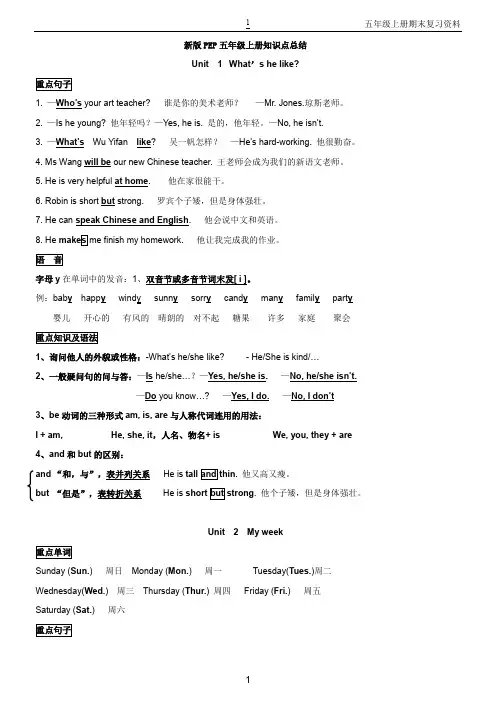
新版PEP五年级上册知识点总结Unit 1 What’s he like?1. —Who’s your art teacher? 谁是你的美术老师?—Mr. Jones.琼斯老师。
2. —Is he young? 他年轻吗?—Yes, he is. 是的,他年轻。
—No, he isn’t.3. —What’s Wu Yifan like? 吴一帆怎样?—He’s hard-working. 他很勤奋。
4. Ms Wang will be our new Chinese teacher. 王老师会成为我们的新语文老师。
5. He is very helpful at home. 他在家很能干。
6. Robin is short but strong. 罗宾个子矮,但是身体强壮。
7. He can speak Chinese and English. 他会说中文和英语。
8. He 他让我完成我的作业。
字母y在单词中的发音:1、双音节或多音节词末发[ i ]。
例:bab y happ y windy sunn y sorr y cand y man y famil y part y 婴儿开心的有风的晴朗的对不起糖果许多家庭聚会1、询问他人的外貌或性格:-What’s he/she like? - He/She is kind/…2、一般疑问句的问与答:—Is he/she…?—Yes, he/she is.—No, he/she isn’t.—Do you know…? —Yes, I do.—No, I don’t3、be动词的三种形式am, is, are与人称代词连用的用法:I + am, He, she, it,人名、物名+ is We, you, they + are4、and和but的区别:and “和,与”,表并列关系He is . 他又高又瘦。
but “但是”,表转折关系He is . 他个子矮,但是身体强壮。
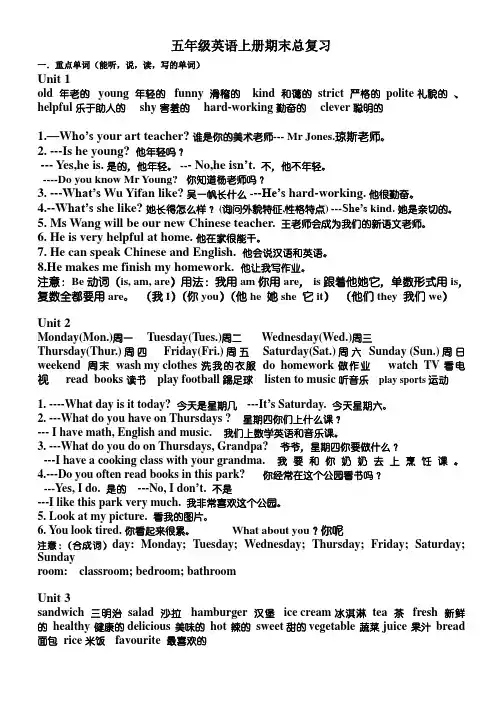
五年级英语上册期末总复习一.重点单词(能听,说,读,写的单词)Unit 1old年老的young年轻的funny滑稽的kind和蔼的strict严格的polite 礼貌的、helpful乐于助人的shy害羞的hard-working勤奋的clever聪明的1.—W ho’s your art teacher? 谁是你的美术老师--- Mr Jones.琼斯老师。
2. ---Is he young? 他年轻吗?--- Yes,he is.是的,他年轻。
--- No,he isn’t.不,他不年轻。
----Do you know Mr Young? 你知道杨老师吗?3. ---What’s Wu Yifan like?吴一帆长什么 ---He’s hard-working.他很勤奋。
4.--What’s she like? 她长得怎么样? (询问外貌特征,性格特点) ---She’s kind. 她是亲切的。
5. Ms Wang will be our new Chinese teacher.王老师会成为我们的新语文老师。
6. He is very helpful at home. 他在家很能干。
7. He can speak Chinese and English. 他会说汉语和英语。
8.He makes me finish my homework. 他让我写作业。
注意:Be动词(is, am, are)用法:我用am你用are, is跟着他她它,单数形式用is,复数全都要用are。
(我I)(你you)(他he 她she 它it)(他们they 我们we)Unit 2Monday(Mon.)周一Tuesday(Tues.)周二Wednesday(Wed.)周三Thursday(Thur.)周四 Friday(Fri.)周五Saturday(Sat.)周六Sunday (Sun.)周日weekend周末wash my clothes 洗我的衣服 do homework做作业watch TV看电视 read books 读书play football 踢足球listen to music听音乐play sports运动1. ----What day is it today? 今天是星期几---It’s Saturday. 今天星期六。
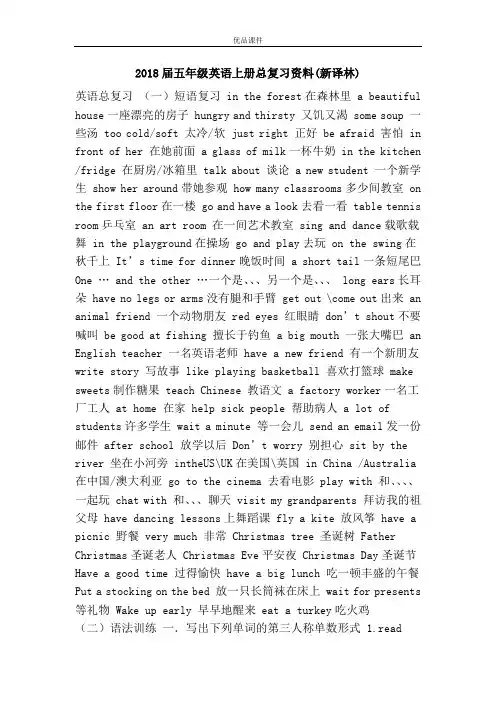
2018届五年级英语上册总复习资料(新译林)英语总复习(一)短语复习 in the forest在森林里 a beautiful house一座漂亮的房子 hungry and thirsty 又饥又渴 some soup 一些汤 too cold/soft 太冷/软 just right 正好 be afraid 害怕 in front of her 在她前面 a glass of milk一杯牛奶 in the kitchen /fridge 在厨房/冰箱里 talk about 谈论 a new student 一个新学生 show her around带她参观 how many classrooms多少间教室 on the first floor在一楼 go and have a look去看一看 table tennis room乒乓室 an art room 在一间艺术教室 sing and dance载歌载舞 in the playground在操场 go and play去玩 on the swing在秋千上It’s time for dinner晚饭时间 a short tail一条短尾巴One … and the other …一个是、、、另一个是、、、 long ears长耳朵 have no legs or arms没有腿和手臂 get out \come out出来 an animal friend 一个动物朋友 red eyes 红眼睛don’t shout不要喊叫 be good at fishing 擅长于钓鱼 a big mouth 一张大嘴巴 an English teacher 一名英语老师 have a new friend 有一个新朋友write story 写故事 like playing basketball 喜欢打篮球 make sweets制作糖果 teach Chinese 教语文 a factory worker一名工厂工人 at home 在家 help sick people 帮助病人 a lot of students许多学生 wait a minute 等一会儿 send an email发一份邮件 after school 放学以后Don’t worry 别担心 sit by the river 坐在小河旁 intheUS\UK在美国\英国 in China /Australia 在中国/澳大利亚 go to the cinema 去看电影 play with 和、、、、一起玩 chat with 和、、、聊天 visit my grandparents 拜访我的祖父母 have dancing lessons上舞蹈课 fly a kite 放风筝 have a picnic 野餐 very much 非常 Christmas tree 圣诞树 Father Christmas圣诞老人 Christmas Eve平安夜 Christmas Day圣诞节Have a good time 过得愉快 have a big lunch 吃一顿丰盛的午餐Put a stocking on the bed 放一只长筒袜在床上 wait for presents 等礼物 Wake up early 早早地醒来 eat a turkey吃火鸡(二)语法训练一.写出下列单词的第三人称单数形式 1.read2.dance3.swim4.like5.play6.watch7.study8. go9.have 10.teach 11.fly 12.make 13.take 14.help 15.do 二.各种职业和人称 (1)Nancy is a _______. She likes _______ stories. A. write; writing B. writer; write C. writer; writing (2)【易错】―What _______ Jack do? ― He’s a _______. A. do; cook B. does; cooker C. does; cook (3) ―What’s_______ job? ―He’s a cook. A.my B.your C.his D.her (4)【易错】Su Hai’s parents are _______.A. cooksB.cookersC. cookes (5)Why do you like (drive)? (6)My mother (like) (make) sweets. (7)There are lots of __________(人) in the forest. (8)The us Art.(teach) 三.主谓宾的肯定【有动词三单式】 (1)She ______ in the hospital. She is a ______. A. works; nurse B. work; doctor C. works; farmer (2)Tom’s uncle___ a new house. A.have B.has C.there isD.is (3)Liu Tao’s mother at home every day. A.teachs B.is teach C.teaches (4)They all (work) in the factory. (5)The man in blue (teach) us English. 四.主谓宾的一般疑问句和特殊疑问句 (1)【易错】____ your uncle work in a factory? A. Is B. Does C. Do (2)【易错】____ your uncle in a factory? A. Is B. Does C. Do (3)--What they do?--They’re workers. A.do B.does C.are (4)I (teach) my brother.(5)My (teach) is a woman. (6)He (not work) in the factory. 五.复习主系表句型 (1)His father is a _______ teacher. A. art B. English C. maths (2) your father a teacher? A.Are B.Do C.Is 六.复习There be句型,和can的用法 (1)There are so many________ in the river. A. boat B. fish C. flower (2)_______she sweets? A.Can, make B.Does, makes C. Are, making (3)--What’s in the box? -- some bread. A.There are B. There is C. They are ( )1.What are jobs? A.h is B.her C.Mike’s D.their ( )2.They are__________ . they can __________cars. A. driver, drive B. drivers, drive C. driver, drives ( )3.My father is a________.She likes _______stories. A. doctor, help B. doctor, helps C. doctor, helping ( )4.【易错】--What does Mrs Liu do?-- is a cook. A.He B.She C.she ( )5.【易错】--Are you policemen?--Yes, . A.I am B.you are C.we are ( )6.Miss Cheng at home every day. A.work B. works C.is work ( )7.What your parent do? A.does B.do C.doing ( )8.-- your uncle write stories? --No,He reads stories. A.Is B.Does C.Do ( )9.-- they ? --No,they are . A.Do;doctors;cook B. Are;doctors;cooks C. Are;doctors;cookers ( )10.-- your sister like singing? --Yes,she . A.Is;is B.Do;does C. Does;does 七.填入适当的词 1.write(名词) 2.write(三单) 3. teach (名词) 4. teach (三单) 5.write(现在分词) 6.work(名词) 7. work(三单) 8. people (复数) 9.policeman (复数)10.watch(第三人称单数) 11.go(第三人称单数) 12.sick (同义词) 13.factory (复数) 14.【易错】They (help) sick people on Monday.15.Helen (do not) her homework at school. 16.--What (do) they (do)? --The y’re (cook). 17.Don’t (eat) a lot of sweets. 18. Miss Li t__________ us Chinese. 19.【易错】There are twelve in the office. (teacher) 20.【易错】He h________ his mother cook dinner in the evening. 21.These __________ (policeman) are very cool. 22.My father and I __________ (have) some story books.23.【易错】My brother likes__________. He can _________ nice food. (cook) 24.__________ (do not) write on the desk. 25.【易错】_____ your sister a _________(nurse) ? 26.Tom can (play) basketball well.So he (play) basketball every day. 27.Su Hai and Su Yang _______ (have) eight lessons this term. 28.There ( be not) any water in the bottle. 29.My mother is a__________(write).She is good at_____________(write). 30.The man in blue______(teach) us English. 31.We help the _____(farm) grow flowers. 32.His uncle is a science (作家). (三)选择适当词语填空一.1. He often ________(have) dinner at home. 2. Daniel and Tommy _______(be) in Class One. 3. We _______(not watch) TV on Monday. 4. Nick _______(not go) to the zoo on Sunday.5. ______ they ________(like) the World Cup?6. What_______they often _______(do) on Saturdays? 7. _______ your parents _______(read) newspapers every day? 8. The girl_______(teach) us English on Sundays. 9. She and I________(take) a walk together every evening. 10. There________(be) some water in the bottle. 11. Mike _______(like) cooking. 12. They _______(have) the same hobby. 13. My aunt _______(look) after her baby carefully. 14. You always_______(do) your homework well. 15. I _______(be) ill. I’m staying in bed. 16. She _______(go) to school from Monday to Friday. 17. Liu Tao _______(do) not like PE. 18. The child often _______(watch) TV in the evening. 19. Su Hai and Su Yang_______(have) eight lessons this term. 20. -What day_______(be) it today? -It’s Saturday 二. 1.The boy__________________ ( draw)a picture now. 2. Listen .Some girls _______________ ( sing)in the classroom . 3. My mother_________________ ( cook )some nice food now. 4. What _____ you ______ ( do ) now? 5. Look . They _______________( have) an English lesson . 6.They ____________(not ,water) the flowers now. 7.Look! the girls ________________(dance )in the classroom . 8.What is our granddaughter doing? She_________(listen ) to music. 9. It’s 5 o’clock now. We_____________(have)supper now10.______Helen____________(wash )clothes? Yes ,she is . 三.1.I ______ a boy. ______ you a boy? No, I _____ not.2. The girl______ Jack's sister.3. The dog _______ tall and fat.4. The man with big eyes _______ a teacher.5. ______ your brother in the classroom?6. Where _____ your mother? She ______ at home.(四)句子翻译1.――你的客厅里有一台电视吗?――不,没有。
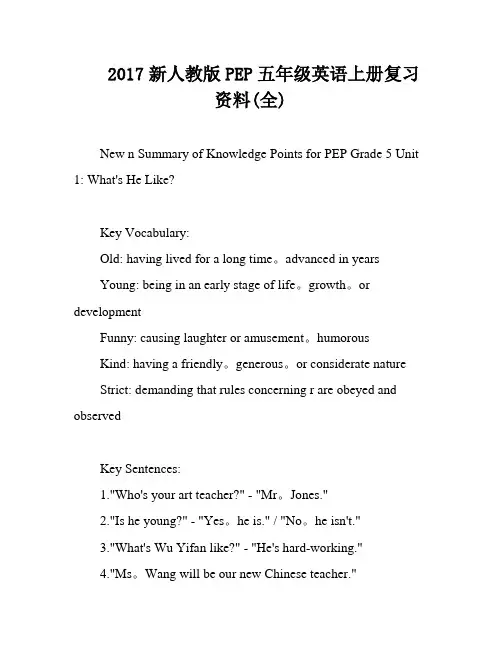
2017新人教版PEP五年级英语上册复习资料(全)New n Summary of Knowledge Points for PEP Grade 5 Unit 1: What's He Like?Key Vocabulary:Old: having lived for a long time。
advanced in yearsYoung: being in an early stage of life。
growth。
or developmentFunny: causing laughter or amusement。
humorousKind: having a friendly。
generous。
or considerate natureStrict: demanding that rules concerning r are obeyed and observedKey Sentences:1."Who's your art teacher?" - "Mr。
Jones."2."Is he young?" - "Yes。
he is." / "No。
he isn't."3."What's Wu Yifan like?" - "He's hard-working."4."Ms。
Wang will be our new Chinese teacher."5."He is very helpful at home."6."Robin is short but strong."7."He can speak Chinese and English."8."He makes me finish my homework."n:The letter "y" at the end of polysyllabic words is pronouncedas [i]。
五年级上册英语复习资料整理五年级上册英语复习资料整理Unit 1 What’s he like?一、四会单词old 年老的 young 年轻的 funny 有趣的,滑稽的 kind 体贴的,和蔼的严格的,严厉的 polite 有礼貌的hard-working 工作努力的 clever 聪明的helpful 有用的 shy 害羞的 short 矮的 tall 高的thin 瘦的 strong 强壮的friendly 友好的 quiet 安静的,文静的二、重点句型1.—Who’s your maths teacher? 谁是你的数学老师?—Mr. Zhang/ Miss White. 张先生/怀特小姐。
2.—What’s he / she like? 他/她什么样?—He’s / she’s kind and他/她既和蔼又严格。
3.Is he / she+体貌或性格特点的形容词?询问某人的体貌或性格特点是不是什么样?—Is he young? 他年轻吗?—/N’t—Ilite? 她有礼貌吗?—/N’t三、语法知识①辅音字母y结尾,且属非重读音节发/ i/。
如:happy baby funny windunny但在my why fly中,在词尾发/ai/(爱)。
②be动词用法及例句am 与第一人称单数 I 连用。
I am a teacher.我是一名老师。
is 与第三人称单数()连用。
He is a boy. 他是一个男孩。
are 与第二人称单复数(you),第一人称复数(we),第三人称复数(they)连用。
You are a student.你是一名学生。
We are students.我们是学生。
※ 助记歌:我用am,你用are,is跟着他(he)、她(she)、它(it);单数is,复数are。
以is、are开头的一般疑问句,回答只有Yes或No两种。
—I? —/ N’t.—Are you Jack? —Yes, I am. / No, I’m not. (注意人称的变化)Unit 2 My week一、四会单词Monday星期一 Tuesday星期二 Wednesday星期三Thursday星期四 Friday星期五Saturday星期六 Sunday星期天weekend 在周末wash my clothes洗我的衣服 play football 踢足球watch TV 看电视pla做体育运动 do homework 做作业 read books(reada book)看书,读书二、重点句型1.—What do you have on Thursdays(复数)? 星期四你有什么课?—I have maths, art and music. 我有数学、美术和音乐课。
(完整word版)2018新人教版PEP五年级英语上册复习资料(全) 五年级上册知识点总结Unit 1 What’s he like?old 老的,年纪大的young 年轻的funny 滑稽的可笑的kind 体贴的strict 严格的polite 有礼貌的shy 羞怯的,怕生的helpful有用的clever 聪明的,聪颖的hard-working工作努力的,辛勤的music 音乐art 美术science 科学English 英语maths/math 数学Chinese 语文,中文sometimes 有时,间或robot 机器人speak说讲(某种语言)1. —Who’s your art teacher?谁是你的美术老师?-Mr. Jones.琼斯老师。
2。
—Is he young?他年轻吗?-Yes, he is。
是的,他年轻。
—No,he isn't.3. —What's Wu Yifan like?吴一帆怎样?—He’s hard—working. 他很勤奋。
4。
Ms Wang will be our new Chinese teacher. 王老师会成为我们的新语文老师. 5. He is very helpful at home. 他在家很能干.6。
Robin is short but strong. 罗宾个子矮,但是身体强壮.7。
He can speak Chinese and English。
他会说中文和英语.8. He。
他让我完成我的作业.字母y在单词中的发音:1、双音节或多音节词末发[ i ]。
例:bab y happ y windy sunn y sorr y cand y man y famil y part y 婴儿开心的有风的晴朗的对不起糖果许多家庭聚会课外补充:2、y在单音节词末发[ai ] 例:b y 乘坐m y 我的wh y 为什么cr y 哭fl y 飞1、询问他人的外貌或性格:-What’s he/she like ? — He/She is kind/…2、一般疑问句的问与答:-Is he/she…?-Yes, he/she is. —No , he/she isn't 。
五年级英语上册总复习资料(全册)班级:姓名:(读背5,要会背)家长签字:_______问词:1Who 谁2What什么3Where在哪里4How如何,怎样5How many 多少6How much多少钱7Is/Are/Do/Can…?通常用Yes/No回答缩写词:1I’d like = I would like我想要2 what’s=what is 什么是3it’s =it is它是4 he’s=he is他是5 she’s=she is她是6 let’s=let us让我们7 they’re=they are它们是8 we’re=we are 我们是9 don’t=do not不10 can’t= can not不会班级:姓名:Unit 1 家长签字:_______要求:加粗部分必须背诵,其它熟读5遍!第一部分:重点单词和句子(要求会背,会写)1、old 老的,年纪大的young 年轻的,岁数不大的funny 滑稽的;可笑的kind 体贴的;慈祥的strict 要求严格的;严厉的polite 有礼貌的;客气的hard-working 工作努力的;辛勤的helpful 有用的;愿意帮忙的clever 聪明的;聪颖的shy 害羞的2、熟读,最好能背。
Ms Wang will be our new Chinese teacher.王女士是我们新语文老师。
What’s she like? 她怎么样?She’s very kind.她很和蔼。
Is she strict? 她严格吗?Yes, sometimes.是的,有时候.Do you know Mr Young?你认识杨先生吗?No,I don?t .不,不认识。
Yes,I do是的,我认识。
Who is your maths teacher? 谁是你的数学老师?Mr Li李先生。
Is he funny? 他搞笑吗?Yes,he is.是的,他搞笑。
2017-2018五年级英语上册总复习资料(全册)Unit 1重点单词和句子1.old。
young。
funny。
kind。
strict。
polite。
hard-working。
helpful。
clever。
shy.Ms。
Wang will be our new Chinese teacher。
What's she like。
She's very kind。
Is she strict。
Yes。
sometimes.Do you know Mr。
Young。
No。
I don't。
Yes。
I do.Who is your maths teacher。
Mr。
Li.Is he XXX。
Yes。
he is。
No。
he isn't.知识点1.Be (is。
am。
are)的用法口诀:be动词am is are;我(I)用am,你(you)用are;is连着他、她、它(he。
she。
it);我们、你们和他们(we。
you。
they),全部都用are。
单数用is,复数用are;he is他是;she is她是;it is它是;you are你(们)是;we are我们是;they are它们是;I am我是。
In English。
there is a difference een "be like" and "do like"。
"What's。
like?" means "What does someone look like?" The answer to this XXX with "He/She/It is。
" followed by words that describe the person's appearance。
On the other hand。
"What does。
Unit 11 想要成为want to be2驾驶飞机fly a plane3帮助人们help people4教英语teach English5烹饪美食cook nice food6害怕….. (be) afraid of…..7擅长于(be) good at…..8掉进……里fall into…..9跳进……里jump into….10 在天空中in the skyUnit 21.住得离……远live far from…2.步行on foot3.乘公共汽车by bus4. 骑自行车by bike5. 乘小汽车by car6.住在格林街live on Green Street7.乘火车take the train8.下车get off9.半小时后after half an hour 10. 乘校车by school bus11.乘地铁by underground12 地铁站an underground station13来学校come to school14住得近live near15走路去学校walk to school16走开go away17 去工作go to work18在一所学校里in a school Unit 31.我的生日聚会my birthday party2.在9.26 on 26th September3.把….带到…bring…..to…..4.最喜欢的颜色favourite colour5.听起来有趣sound interesting6.玩得愉快have some fun7.在五月一日on 1st May8.邮局post office9.一块吐司a piece of toast10.立即、马上right away11.在下午in the afternoon12 看look at13 欢迎来…… welcome to….. Unit 41.下国际象棋play chess2.在英国in the UK3.给…..写邮件write emails to….4.在周末at the weekend5.做运动play sport6.打乒乓球play table tennis7.去购物go shopping8. 去公园go to the park9. 去看电影go to the cinema10.在厨房in the kitchen11.跑向…..run to…..12. 橘汁orange juice13 出租车司机taxi driver14 擅长(be) good at15 公共汽车站bus stop16住在live in18在车站at the bus stop19在12点at twelve o’clock 20重阳节the Double Ninth Festival21踢足球play football22 打排球play volleyballUnit 51.在同一个班级in the same class2.都喜欢运动both like sport3.穿过马路cross the street4.提重东西carry heavy bags5.玩单词游戏play word games6.打电话make phone calls7.所有Olive的朋友all Oliver’s friends8.在不同的班级in different classes9.小学primary school10.尽情玩have fun11 互相each other12 读书read some booksUnit 61.在客厅in the living room2.做我的家庭作业do my homework3.在卧室in the bedroom4.制作飞机模型make a model plane5.在浴室里in the bathroom6.洗我的头发wash my hair7.做晚饭cook dinner8.做午饭cook lunch9.关掉turn off10.看电视watch TV10.看星星look at stars11.看故事书read a storybook12.在就寝之前before bedtime13.给我们讲故事tell us a story14.掉下来fall down15 在家at home16 想要做want to do17 打电话make phone calls18 在晚上in the evening19 给….写电子邮件write emails to…..Unit 71.在度假(be) on holiday2.在海滩上at the beach3.享受阳光enjoy the sunshine4.坐在Sally旁边sit beside Sally5.捡贝壳collect shells6.玩得愉快have a good time7.写一封信write a letter8.把...扔进...里throw...into...9.住在... live in...10.十一岁eleven years old Unit 81.读地图read the map2.在小山上on the hill3.在...顶部at the top of4.另一封信another letter5.像... be like6.在花园里in the garden7.逃跑run away8.追着...跑run after...9.用钥匙打开门open the door with the key10.穿过get throughUnit 91.离...远far from...2.十分近quite near3.到达邮局get to the postoffice4.沿着...走walk along...5.在...左转turn left at...6.直走walk straight7.在你的右边on your right8.在A和B之间between A andB9.左转turn left10.一幅...的地图a map of...11.到达那儿get thereUnit 101.轻轻地吹blow gently2.猛烈地吹blow strongly3.高兴地放风筝fly their kiteshappily4.慢慢地转move slowly5.快速地转move quickly6.风的声音the sound of thewind7.剪一些纸cut some paper8.做一个纸风铃make a paperwind-bellUnit 111.来自come from2.用水use water3.种植庄稼grow crops4.扑灭火put out fires5.变热get hot6.飞越了山和水fly over rivers and mountains7.掉到地上fall down to theground8.在树里面inside the tree Unit 121.烧毁burn down2.伤人hurt people3.对...小心(be) careful with...4.用火安全fire safety5.玩火柴play with matches6.安全第一safety first7.石头时代the Stone Age8.一点也不not at all9.在火上on the fireU1—U12 重点句型Unit 11.- What do you want to be?- I want to be a pilot.Unit 22.- How do you come to school ? - I come to school on foot. Unit 33.- When’s your birthday?- It’s on 26th September.Unit 44.- What do you usually do with your grandparents?- I usually play chess with my grandma.Unit 55.We both like sport. Unit 66.- What are you doing?- I’m doing my homework. Unit 77.- Is Paul collecting shells?- Yes, he is.Unit 88. - What are you doing?- I’m doing my homework. Unit 99. - Walk along Winter Street.- Turn left at Spring Street. Unit 1010. - The children are flying their kites happily.Unit 1111. We use water to wash our hands.Unit 1212.- We must be careful with fire.- We mustn’t play with matches.1.询问对方职业理想:– a …–to be a …2.询问对方怎么来到某地:地点?…by bus(car…)或地点?…by bus(car…)3.询问某人生日日期:- When’s +形物代(my,your,his…)+birthday ?- 具体日期(26th September)4.询问某人通常做什么:- What do you usually do after school?–或–5.表达“我们两个都喜欢…”:+名词/动词ing形式。
2017PEP 小学英语五年级上册全册复习要点2017PEP小学英语五年级上册全册复习重点Unit1:young年青的 funny 风趣可笑的tall高的strong强健的 ind 平和的、和蔼的; old 年迈的 short 矮的 thin 瘦的 r先生 lie 像、喜爱 strict 严格的 sart 聪慧的、奇妙的 active 踊跃的、活跃的 quiet 寂静的、娴静的 very 很、特别 but 可是Unit2:ondy 礼拜一 Tuesday 礼拜二 Wednesday礼拜三 Thursday 礼拜四 Friday 礼拜五 Saturday 礼拜六 Sunday 礼拜天 day天 have 有、吃 on 在 .. 时候 dohoewor 造作业 watchTV 看电视readboos 念书Unit3 :eggplant茄子fish鱼greenbeans青豆tofu potato土豆toato西红柿for为lunch中餐we我们好吃的sweet甜的sour酸的fresh新鲜的salty favourite最喜爱的they ’ re=theyare他们是fruit豆腐tasty 咸的水果grape 葡萄Unit4:cootheeals做饭 watertheflowers浇花sweepthefloor扫地 cleanthebedroo打扫寝室aethebed铺床setthetable摆饭桌washtheclothes 洗碗碟dothedishes 整理衣服useacoputer 使用计算机Unit5 :curtain空调 trashbin垃圾箱closet壁橱irror镜子endtable 床头柜 bedroo 寝室 itchen厨房bathroo洗手间livingroo客堂 in在里面on 在上边under 在下边near 在 .. 旁边 behind 在后边clothes衣服Unit6:river河流 flower花grass草lae湖泊forest丛林path 路 par 公园 picture照片house房屋bridge桥tree树road 公路building 建筑物clean 洁净的五年级上册四会句子:1.谁是你的英语老师? carter先生。
班级: 姓名: (读背5,要会背) 家长签字:_______ 问词:1Who 谁 2What 什么3Where 在哪里4How 如何,怎样5How many 多少6How much 多少钱7Is/Are/Do/Can …?通常用Yes/No 回答 缩写词:1I ’d like = I would like 我想要2 what ’s=what is 什么是3it ’s =it is 它是 4 he ’s=he is 他是 5 she ’s=she is 她是 6 let ’s=let us 让我们 7 they ’re=they are 它们是8 we ’re=we are 我们是 9 don ’t=do not 不 10 can ’t= can not 不会第一部分:重点单词和句子(要求会背,会写)1、 old 老的,年纪大的 young 年轻的,岁数不大的 funny 滑稽的;可笑的 kind 体贴的;慈祥的 strict 要求严格的;严厉的 polite 有礼貌的;客气的 hard-working 工作努力的;辛勤的 helpful 有用的;愿意帮忙的 clever 聪明的;聪颖的 shy 害羞的2、熟读,最好能背。
Ms Wang will be our new Chinese teacher.王女士是我们新语文老师。
What’s she like? 她怎么样? She’s very kind.她很和蔼。
Is she strict? 她严格吗? Yes, sometimes.是的,有时候.Do you know Mr Young?你认识杨先生吗?No,I don’t .不,不认识。
Yes,I do 是的,我认识。
Who is your maths teacher? 谁是你的数学老师? Mr Li 李先生。
Is he funny? 他搞笑吗?Yes ,he is .是的,他搞笑。
No ,he isn’t .不,不搞笑。
第二部分:知识点1.Be(is, am, are) 的用法口诀be 动词 am is are ;我(I)用am,你(you)用are; is 连着他,她,它(he, she, it); 我们,你们和他们(we, you, they),全部都用are(单数 is ;复数are ;he is 他是;she is 她是; it is 它是;you are 你(们)是; we are 我们是; they are 它们是;I am 我是 )2. be like 与do like:What’s …like ?是问”某某长什么样子?”的意思。
它的答语一般用:He/She/ It is…(后面跟描写人的外貌特征的词语)。
而在What does … like? 的句子中,like是“喜欢”的意思。
如:What does your father like? 你的爸爸喜欢什么?它的答语是He/She/ It likes…(后面跟喜欢的东西)。
第三部分:发音-y [i] baby 婴儿happy 高兴windy 刮风的sunny 晴朗的sorry 抱歉-y [ai] shy 害羞的why 为什么my 我的fly 飞第一部分:重点单词和句子(要求会背,会写)新课标第一网1、Monday 星期一Tuesday 星期二Wednesday 星期三Thursday星期四Friday 星期五Saturday星期六Sunday星期天weekend 周末wash 洗wash my clothes 洗我的衣服watch 看watch TV 看电视do 做;干do homework 做作业read 看;读read books 看书play 踢;玩play football 踢足球(每周的第一天是周日Sunday,first第一;second第二;third第三)2、熟读1What do you have on Thursdays ? 星期四你有什么课?I have maths, English and music.我有数学课,英语课和音乐课。
2What do you do on Wednesdays?你星期三都在做什么?I often do my homework . 我通常在写我的家庭作业。
3What do you often do on the weekend?你周末常干什么?I often watch TV.我常看电视.Sometimes I read books. 有时候我看书。
4Do you often read books in this park? 你常常在这个公园读书吗?No, I don’t.不,我不经常在这看书。
Yes, I do. 是的,我经常。
5What do we have on Wednesdays ?星期三我们都有什么课?6We have English、science and computer on Wednesdays.我们星期三有英语、科学和计算机。
7What day is it today?今天是星期几?It’s Monday.今天是星期一。
8You look tired. 你看起来很累。
9You should play sports everyday. 你应该每天做运动。
第二部分:知识点1. 合成词:两个简单的单词放在一起,变成一个新的单词,如:bedroom,classroom)2. in, on ,at 后面跟表示时间的词语时(1)表示在某段时间,如在上午,下午,晚上用in.如in the morning, in the afternoon, in the evening.(2)表示在某日,在星期几时,用on。
如on Monday, on Sunday .(on后面跟某一天,某一天前面用on,on the weekend)(3)表示在几点几分,在几点时,用at. 如at 6:30, at 9 o’clock.3.理解、区分这两个句型(have:有,吃;do:干、做)What do you have on Mondays? (周一你们都有什么课?)We have Chinese, English, math and science on Mondays.What do you do on Mondays? (周一你都做什么?)I often do homework, read books and watch TV.1、Sandwich 三明治salad 沙拉hamburger 汉堡包ice cream 冰淇淋tea 茶fresh 新鲜的;刚摘的healthy 健康的delicious 美味的;可口的hot 辣的;辛辣的sweet 含糖的;甜的2、熟读What’s your favo urite food? 你最喜欢的食物是什么?My favourite food is fish.我最喜欢的食物是鱼。
What would you like to eat? 你想吃什么?I’d like some noodles我想吃面条。
What would you like to drink ? 你想喝什么?I’d like some water. I’m thirsty我要一些水,我渴了。
My favorite food is ice cream .It is sweet. 我最喜欢的食物是冰淇淋,它很甜。
I don’t like beef but chicken is OK我不喜欢牛肉但是鸡肉可以。
I like vegetables but not carrots我喜欢蔬菜,但是不喜欢胡萝卜。
第二部分:知识点1.吃饭时,询问他人想吃和想喝什么时,----What would you like to eat/drink? (你想要吃/喝什么?)-I’d l ike a sandwich/hamburger/ an egg, please(我想要一个三明治/汉堡/蛋.) (问句中问到would you like,答句中要回答I ‘d like…=I would like…) tea/milk/juice/water, please. 我想要点茶/牛奶/果汁/水。
注意:可数的食物也可以在前面加上数字,表示几个,如:I’d like two hamburgers/three sandwiches/five hot dogs, please.我想要两个汉堡/三个三明治/五个热狗.2.当你想知道你朋友或父母最爱吃的食物或最爱喝的东西是什么时,---What’s your favourite food/drink?---Ice cream. It’s sweet./ Juice. It’s healthy.3.单词的复数形式(1)一般情况下,在单词后面直接加s;(2)以s, x, ch, sh,o,结尾的单词,加es(potatoes;tomatoes)(3)people, fish,sheep单数形式和复数形式一样,不加s.4.Some用于肯定句,any用于疑问句和否定句第三部分:发音ow [au] cow 奶牛flower 花WOW 哇down 向下ow [əʊ] slow 慢的snow 雪yellow 黄色window 窗户1、Sing 唱;唱歌song 歌曲sing English songs 唱英文歌曲play the pipa 弹琵琶kung fu 功夫;武术do kung fu 练武术dance 跳舞draw 画cartoon 漫画draw cartoons 画漫画cook 烹调;烹饪swim 游泳play basketball 打篮球ping pong 乒乓球play ping pong 打乒乓球speak English 说英语2、签名:(Can \We’ll\should 后面跟动词原形)---What can you do for the party? (你能为聚会做什么?)---I can dance/do kung fu/ play the pipa. (我会跳舞/打武术/弹琵琶。
)----Wonderful极好的。
---Can you swim/cook/play ping-pong? (你会游泳/烹饪/打乒乓球吗?)----Yes.,I can. 是的,我会。
/ No, I can’t.不,我不会。
---I ca n’t do any kung fu . 我不会武术。
---No problem. I can help you. 没问题,我会帮你的。
**************************************.请给我发送电子邮件。